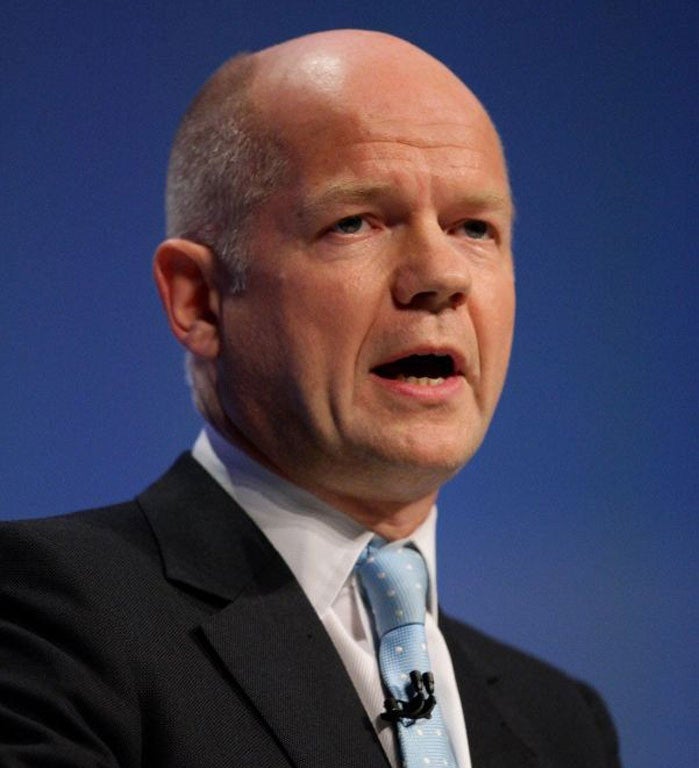
Foreign Secretary William Hague called today for more sanctions against Iran to "increase the isolation of the regime" from the international community.
Arriving at talks in Brussels, he said his focus was on tightening the financial screw, but he acknowledged there would be a "variety of views" among his EU counterparts on whether to ban Iranian oil imports.
Mr Hague repeated his thanks for the support of member states including Germany, France and the Netherlands, which have withdrawn their ambassadors from Iran following the attack on the UK embassy in Teheran.
The Foreign Secretary said: "I am very strongly impressed by the support of our partners after this grievous violation. Today we will discuss more measures against Iran. I hope we will agree an intensification of economic sanctions to increase the isolation of the regime."
Asked about the possibility of targeting Iran's oil wealth, he said: "I am sure there will be discussions about oil sanctions, with a variety of views on that".
The EU foreign ministers will also be discussing the deteriorating situation in Syria, with Mr Hague highlighting what he said was a link between the Syrian and Iranian regimes.
Iran had been giving support to the suppression of dissent in Syria, he said, even while Iran had welcomed public protests in other parts of the world during the Arab Spring.
As far as Syria and Iran were concerned, he said, "human rights and democracy have taken a step backwards".
Earlier, Mr Hague told BBC Radio 4's Today programme: "I stress that the measures that I hope we will agree today are related to the Iranian nuclear programme.
"These are not measures that are in reaction to our embassy. There has been a range of other reactions to that.
"Our long-term concern is, of course, the nuclear programme, the danger that poses to the peace of the Middle East and the wider world, the threat of proliferation spreading to other countries in the region."
He said the dual attacks on British compounds were "clearly premeditated" but claimed there were "divisions within the Iranian regime" about the move.
He added: "We have often had difficulties, of course, in operating in Tehran.
"We have tolerated those difficulties. Locally-engaged staff have been bullied and harassed by the Iranian authorities.
"When our new ambassador arrived in October, he was greeted with a Molotov cocktail over the wall.
"These things have happened and we have protested about them but this was on a totally different scale."
He said it was "regrettable" that the embassy had been closed but there was "no way" he could ask staff to serve there when the government was involved in the action against them.
The retaliatory closure by the UK of Iran's London embassy and the expulsion of its staff has deepened the diplomatic rift, with Mr Hague describing London-Teheran relations as having been reduced to the "lowest level consistent with the maintenance of diplomatic relations".
The EU already has a range of sanctions against Iran, including targeting dozens of individuals associated with the regime, who are banned from travel in Europe, where their assets are frozen.
The UK went one further, unilaterally cutting all financial ties with Iranian banks in response to mounting fears over the country's nuclear ambitions.
The foreign ministers agreed the extension of sanctions against Iran and Syria, adding 180 individuals and Iranian companies associated with the Iran regime to a list of those banned from travel in Europe and whose European assets are frozen.
On Syria, the eighth round of EU sanctions against the regime also extends travel bans and the freezing of assets, but an oil embargo against both regimes was not given final approval because of Greek concerns over the impact on its already dire economy.
Correspondents say foreign ministers failed to agree on an oil embargo against Iran because some EU countries are dependent on Iranian oil.
But one EU official said the final conclusions of the talks paved the way for oil embargoes in the next round of sanctions if necessary.
An agreed statement said the focus in Iran was on measures aimed at "severely affecting the Iranian financial system, in the transport sector, in the energy sector".
PA
Subscribe to Independent Premium to bookmark this article
Want to bookmark your favourite articles and stories to read or reference later? Start your Independent Premium subscription today.

Join our commenting forum
Join thought-provoking conversations, follow other Independent readers and see their replies